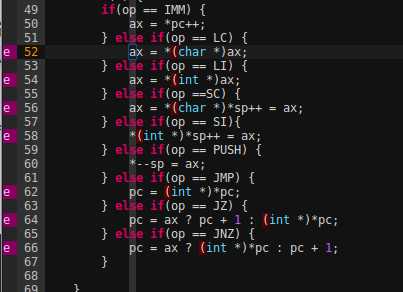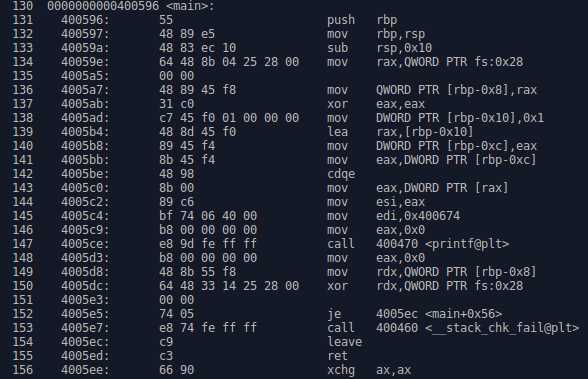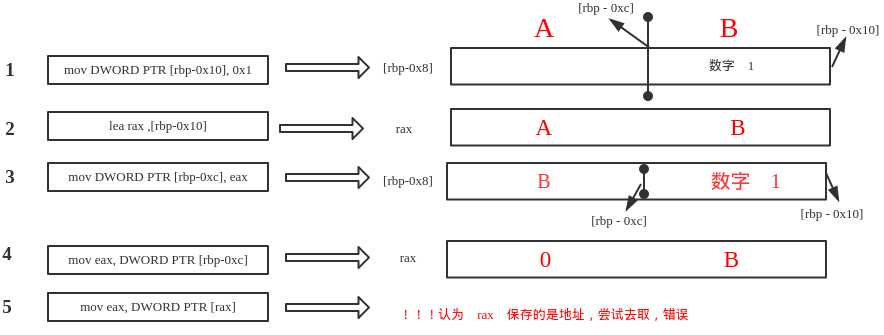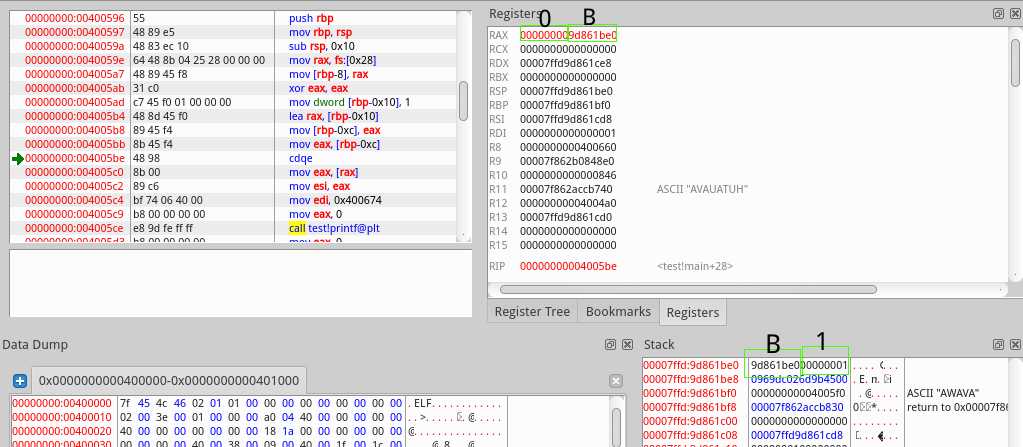标签:负数 sign and 指令 构建 contents g++ 标准 接下来
这篇手把手教你构建 C 语言编译器,里面有着这样的代码
void eval() {
int op, *tmp;
while (1) {
if (op == IMM) {ax = *pc++;} // load immediate value to ax
else if (op == LC) {ax = *(char *)ax;} // load character to ax, address in ax
else if (op == LI) {ax = *(int *)ax;} // load integer to ax, address in ax
else if (op == SC) {ax = *(char *)*sp++ = ax;} // save character to address, value in ax, address on stack
else if (op == SI) {*(int *)*sp++ = ax;} // save integer to address, value in ax, address on stack
}
...
return 0;
}
只看op == LC这段代码,ax是一个int类型,存放的值是char *指针类型地址,取完该地址所在的值再赋给变量ax
但是如此写代码,vim的youcomplete插件一直报错

那就举个例子
//test.c
#include <stdio.h>
int main() {
int a = 1;
int p = &a;
printf("the result is %d\n",*((int*)p));
}
试试32位gcc
~$ gcc test.c -o test
test.c: In function ‘main’:
test.c:4:13: warning: initialization makes integer from pointer without a cast [enabled by default]
int p = &a;
~$ ./test
the result is 1
虽然有警告,依然能运行成功正确输出,接下来试试32位g++
~$ g++ test.c -o test
ltest.c: In function ‘int main()’:
test.c:4:14: error: invalid conversion from ‘int*’ to ‘int’ [-fpermissive]
int p = &a;
直接抛出错误
试试64位gcc
ch@ch-pc:~$ gcc test.c -o test
test.c: In function ‘main’:
test.c:4:13: warning: initialization makes integer from pointer without a cast [-Wint-conversion]
int p = &a;
^
test.c:5:35: warning: cast to pointer from integer of different size [-Wint-to-pointer-cast]
printf("the result is %d\n",*((int*)p));
^
ch@ch-pc:~$ ./test
段错误 (核心已转储)
运行时才出错,那么试试64位g++
ch@ch-pc:~$ g++ test.c -o test
test.c: In function ‘int main()’:
test.c:4:14: error: invalid conversion from ‘int*’ to ‘int’ [-fpermissive]
int p = &a;
^
test.c:5:41: warning: cast to pointer from integer of different size [-Wint-to-pointer-cast]
printf("the result is %d\n",*((int*)p));
编译不通过
当然-m32这种参数,就不讨论了
g++编译的时候就认为是个错误,gcc32位编译可以正常运行,64位运行时报错 我们探讨一下原因,32位和64的int类型都是4个字节的,但是指针类型的大小不一致
#include <stdio.h>
int main() {
int *p;
printf("the result is %lu\n", sizeof(p));
}
分别在32位和64位编译器(注意是编译器,64位系统也有可能有32位编译器)编译后,运行
32位结果为"the result is 4"
64位结果为"the result is 8"
64位,gcc编译后,拿到test可执行程序,程序执行会出现段错误,现在来反汇编一下
//test.c
#include <stdio.h>
int main() {
int a = 1;
int p = &a;
printf("the result is %d\n",*((int*)p));
}
//编译
~$ gcc test.c -o test
// objdump反汇编命令
// -S 尽可能尽可能反汇编出源代码
// -M 因为个人习惯问题,不太会看AT&A的汇编,还是搞成intel的来看
// nl只是把上面的结果显示一下行数,-b 行的显示方式
// -ba //显示所有行号(包括空行)
// -bt //显示所有行号(但不包括空行)
~$ objdump -S -M intel test | nl -ba
主要看一下,main函数


我们来用edb调试的结果,也跟想得一样

有一点我上面并没有讲到,就是上图4行的 rax 过渡到上图5行的时候高位并不一定是零,因为在142行的时候,有一个指令cdqe,这是eax拓展成rax的指令,所有要根据eax的正负性来判断.也就是说,如果eax表达出来是负数,rax的高位补出来的是全f;同理eax正数的情况下,rax高位补全的才是0
在c99的标准库里面有一个结构体,intptr_t可以实现编译器位数兼容性
//头文件stdint.h
/* Types for `void *‘ pointers. */
#if __WORDSIZE == 64
# ifndef __intptr_t_defined
typedef long int intptr_t;
# define __intptr_t_defined
# endif
typedef unsigned long int uintptr_t;
#else
# ifndef __intptr_t_defined
typedef int intptr_t;
# define __intptr_t_defined
# endif
typedef unsigned int uintptr_t;
#endif
上述测试代码改成这样即可
#include <stdio.h>
#include <stdint.h>
int main() {
int a = 1;
int p = &a;
printf("the result is %d\n",*((int*)(intptr_t)p));
}
原始代码改成下面即可
if(op == IMM) {
ax = *pc++;
} else if(op == LC) {
ax = *(char *)(intptr_t)ax;
} else if(op == LI) {
ax = *(int *)(intptr_t)ax;
} else if(op ==SC) {
ax = *(char *)(intptr_t)*sp++ = ax;
} else if(op == SI){
*(int *)(intptr_t)*sp++ = ax;
} else if(op == PUSH) {
*--sp = ax;
} else if(op == JMP) {
pc = (int *)(intptr_t)*pc;
} else if(op == JZ) {
pc = ax ? pc + 1 : (int *)(intptr_t)*pc;
} else if(op == JNZ) {
pc = ax ? (int *)(intptr_t)*pc : pc + 1;
} else if(op == CALL) {
*--sp = (int)(intptr_t)(pc + 1);
pc = (int *)(intptr_t)*pc;
} else if(op == ENT) {
*--sp = (int)(intptr_t)bp;
bp = sp;
sp = sp - *pc++;
} else if(op == ADJ) {
sp = sp + (intptr_t)*pc++;
}
标签:负数 sign and 指令 构建 contents g++ 标准 接下来
原文地址:http://www.cnblogs.com/xuanhun/p/6094660.html